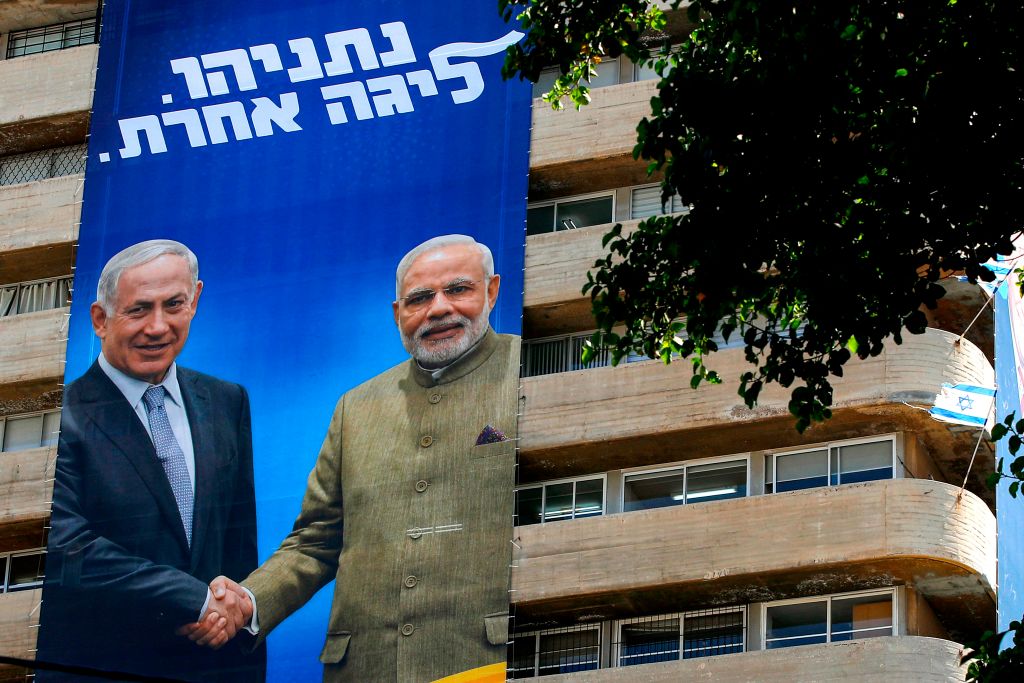
When Hamas launched its unprecedented attack against Israel on Oct. 7, killing 1,200 people, Indian Prime Minister Narendra Modi, like most world leaders, condemned Hamas’s horrific actions and expressed “solidarity with Israel at this difficult hour.” But the Modi government’s approach in the days and weeks that followed have set it apart from many non-Western peers. That divergence notably includes India abstaining from a U.N. resolution on Oct. 27 that called for a “humanitarian truce” (120 countries voted in favor).
India’s approach has surprised many observers for various reasons. First, the Indian government’s relative quiet about the plight of Palestinians in Gaza as the death toll tops 11,000 marks a departure from its consistent support for Palestinians since 1948. Even in the recent past, as India and Israel developed defense and commercial ties, New Delhi’s support for Israel was tempered by its historical ties. Second, through its presidency of the G-20 in 2023, India signaled its ambition to represent the voice of the Global South and ensure the developing world’s concerns get heard.
Historically, India has had a very different relationship with Israelis and Palestinians. During India’s struggle for independence from the British, the Indian anti-colonial movement supported Palestinian nationalists and India proposed a plan in 1947 to create an independent federal state of Palestine (with constitutional safeguards for the Jewish minority). The reasons were complex, stemming in part from the unease of India’s post-colonial, nationalist elites about the wisdom of creating what they perceived to be a settler state in the erstwhile British Mandate for Palestine. Consequently, when the U.N. General Assembly passed a resolution in 1947 that recommended establishing the State of Israel alongside a Palestinian one, a newly independent India was one of the few non-Arab countries that voted against the measure.
Pragmatic considerations shaped India’s position. Indian leaders felt that they could not endorse a state that was founded on religious grounds, especially coming so soon after the violent Partition of India in 1947 that led to Pakistan’s creation, an outcome that they had staunchly opposed.
India formally recognized Israel in 1950. But Indo-Israeli contacts were limited given Prime Minister Jawaharlal Nehru’s fear of stirring opposition, particularly from Indian Muslims. At the time, India also wanted to present itself as a standard-bearer against colonialism and to demonstrate its solidarity with newly decolonized Arab states, which were being courted by Pakistan. In 1974, India became the first non-Arab country to recognize the Palestine Liberation Organization as the “sole and legitimate representative of the Palestinian people.” India again claimed another first when it became the first non-Arab country to recognize the State of Palestine when the PLO proclaimed it in 1988.
It was not until 1992 that India granted full diplomatic recognition to Israel, including the opening of the Israeli Embassy in New Delhi. With the Cold War over and the impending Oslo Accords—which sought rapprochement between Israel and the Palestinians—India chose to end its policy of keeping Israel at a calculated distance. Since then, the Indo-Israeli relationship has developed steadily, especially when it comes to defense cooperation. A turning point came in 1999 when India went to war with Pakistan over the disputed Kashmir region and Israel demonstrated its willingness to provide arms and ammunition. In recent years, India has purchased about $2 billion worth of weapons annually from Israel. India has bought missiles, drones, bombs, and border-security equipment, and is now the Israeli defense industry’s biggest foreign customer.
Modi’s election in 2014 put the Indo-Israeli rapprochement into higher gear. While previous governments had made sure to keep their dealings with Israel largely silent, the Modi government has been public in its engagement with Israel. Modi was the first Indian Prime Minister to visit Israel in 2017, which was reciprocated when Netanyahu traveled to Delhi in 2018. The ideological alignment between the two right-wing leaders has certainly been more apparent than with previous governments. Members of Modi’s Hindu nationalist Bharatiya Janata Party have long regarded Israel as a model religious-nationalist state to potentially build on, in contrast to India’s founding as a secular and multi-religious one.
Still, India has reaffirmed its support for the Palestinian cause in recent years. Modi became the first Indian Prime Minister in 2018 to visit Ramallah in the occupied West Bank. India has also increased its donations to the U.N. Relief and Works Agency for Palestine Refugees in the Near East. These various gestures were meant to remind both internal and external audiences of India’s complicated stance on the Israeli-Palestinian conflict.
India’s tilt toward Israel encompasses growing trade and defense cooperation, ideological and leadership affinities, and a focus on counter-terrorism cooperation. But India is aware of potential diplomatic costs and Modi has spoken to various Arab Gulf leaders to coordinate positions; earlier this month, India voted in favor of a U.N. General Assembly resolution that condemned Israeli settlements in East Jerusalem, the West Bank, and Golan Heights.
The challenge for India ahead is maintaining the strategic defense and commercial ties with Israel while navigating its role as a Global South leader. It is a tight rope to walk.
More Must-Reads From TIME
- The 100 Most Influential People of 2024
- Coco Gauff Is Playing for Herself Now
- Scenes From Pro-Palestinian Encampments Across U.S. Universities
- 6 Compliments That Land Every Time
- If You're Dating Right Now , You're Brave: Column
- The AI That Could Heal a Divided Internet
- Fallout Is a Brilliant Model for the Future of Video Game Adaptations
- Want Weekly Recs on What to Watch, Read, and More? Sign Up for Worth Your Time
Contact us at letters@time.com